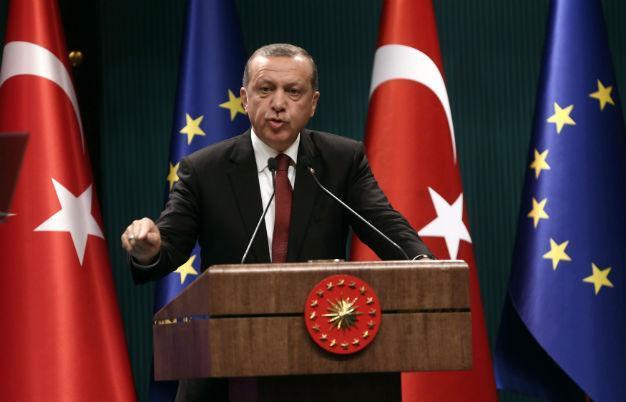Erdoğan approves ‘benchmark law,’ EU sources say visa liberalization to be delayed
ANKARA/BRUSSELS

AFP photo
Turkish President Recep Tayyip Erdoğan has approved a law on forming a panel to monitor the discipline of law enforcement officials, one of the last hurdles remaining before the country wins visa-free access to Europe for its nationals, but EU officials said Turkey was set to miss a June deadline in the deal because of a dispute over a Turkish anti-terrorism law.Erdoğan approved a law on an agreement between Ankara and Brussels on the readmission of people residing in the EU without authorization on May 18, as well as other required laws on May 19.
All five laws and agreements approved by Erdoğan on May 18 and May 19 were published in the May 20 edition of the Official Gazette.
In Brussels, however, EU officials and diplomats said the exemption of Turkish nationals from visa requirement across the EU’s Schengen zone by June, the main reward for Ankara’s collaboration in cutting off the influx of migrants into Europe, may now come in July at the earliest but more likely not until the fall, Reuters reported on May 19.
The 28-nation bloc is dependent on Ankara to enforce a deal, criticized by rights groups, that has sharply cut the number of refugees and migrants reaching Greece, giving EU leaders breathing space after more than a million arrived last year.
Ankara has yet to meet five of the 72 requirements for visa liberalization, according to the executive European Commission, which proposed earlier this month the relaxation of travel rules for Turks if Turkey fulfilled the benchmarks by the end of June.
But the European Parliament, which must approve the visa decision, has refused to start work on the proposal until Ankara meets the criteria in full. Parliament President Martin Schulz said he did not see that happening before the end of June.
“De facto a decision in June is not possible anymore,” an EU source familiar with the negotiations told Reuters.
Lawmakers could still theoretically vote on the plan at their final plenary session on July 4-7, but will more likely do so after the summer break.
The main priority for Erdoğan, who has refused to amend anti-terror laws to meet the EU criteria, is to change the constitution to secure extensive presidential rule, and he has said October would also be acceptable for visa liberalization.
“An October scenario is possible, but also July. Let’s see how the Turks comply,” another EU source told Reuters.
EU sees ball in Turkey’s court
The EU says Turkey must narrow its definition of terrorist crimes, which leads to extensive application of the law against intellectuals and critics of Erdoğan, including dozens of journalists and academics.
Turkey has repeatedly declined to do so, saying the law is crucial in its fight with jihadists from the Islamic State of Iraq and Levant (ISIL) and militants of the outlawed Kurdistan Workers’ Party (PKK).
The EU is now waiting to see what a new government will do on the outstanding criteria after a meeting of the ruling Justice and Development Party (AKP) on May 22 picks a new prime minister, diplomats said.
“We’ve been through this before,” another EU official with long experience of negotiating with Ankara told Reuters. “It’s not the first time there has been quite provocative talk from the Turkish side, then we sat down and found a way forward.”
‘Better align,’ not ‘fully align’
Sources in Brussels have been stressing that the commission’s report said Turkey should “better align” – rather than “fully align” – its counter-terrorism regulation with EU norms, including to bring in more proportionality in punishment for any violations. That offers room for compromise.
Keeping the migration accord on track is a key priority for several EU member states, especially the bloc’s biggest power, Germany, which took in most of the 1.3 million refugees and migrants who reached Europe last year.
The EU also promised revitalized EU accession talks and an initial 3 billion euros in aid for Syrian refugees in Turkey in return for Ankara’s help on migration, and it has taken steps recently to speed up disbursement.
Turkey is only due to start issuing the advanced biometric passports required for visa-free travel in October.
As an interim solution, as of June 2016, Turkey will issue short-term biometric passports including both a facial image and fingerprints of passport holders who wish to make use of visa-free travel to the EU.
Given the European Parliament’s tough stance on human rights and public anxiety in several EU states about granting visa-free entry to a largely Muslim population of 79 million, the room for compromise is limited.
“We’ve got to get something that is more than a symbolic gesture from them on terrorism. The market will demand it,” the first EU source said.
















